By Serene Leong
Children are naturally curious about the world around them. But how do we nurture that curiosity into kindness for our planet?
It is important for children to be taught from an early age how to care for the environment and the animals that live in it. It helps them to understand that the earth is our home, and we need to be good stewards to ensure a sustainable future for us and the next generation. It also helps them to learn that their actions have the power to create change – whether for good or bad – and a small action can make a great ripple effect.
Teaching children to care for our environment not only inculcates responsible habits but is also a great way to have lessons outdoors.
Two of our schools conducted their own creative and fun activities for the children to learn the importance of sustainability.
- Read to them about what is happening in the world

Parents can take the opportunity when spending time with their children outdoors to teach them how to appreciate nature, or even share pictures and newspaper articles about climate change and how it affects us.
At The Ascension Kindergarten, one of our parents, Sophia Huang, a children’s author and upcycling enthusiast, read her book “Mr Roll Finds New Life” to the children at an assembly session in Term 3 last year. She shared about upcycling and the fun games she created out of recyclable materials!
The children learnt about how plastics are harmful to the environment and started to be interested in upcycling.
Senior Teacher Ms Patricia Eduarte said: “They realised, ‘Oh no, this plastic bag may be mistaken for a jellyfish and sea turtles may eat them, or this straw may get stuck in the sea turtle’s nose.’ They understood how plastics can hurt the animals and they were really concerned about it.”
To reinforce the lesson, the teachers gave the children an upcycling assignment at home – they were asked to create something with their parents using recyclable materials like plastic bags and to bring the item to school for a show and tell.
To our teachers’ surprise, one child used plastic bags to create a dress and another child made a jump rope!
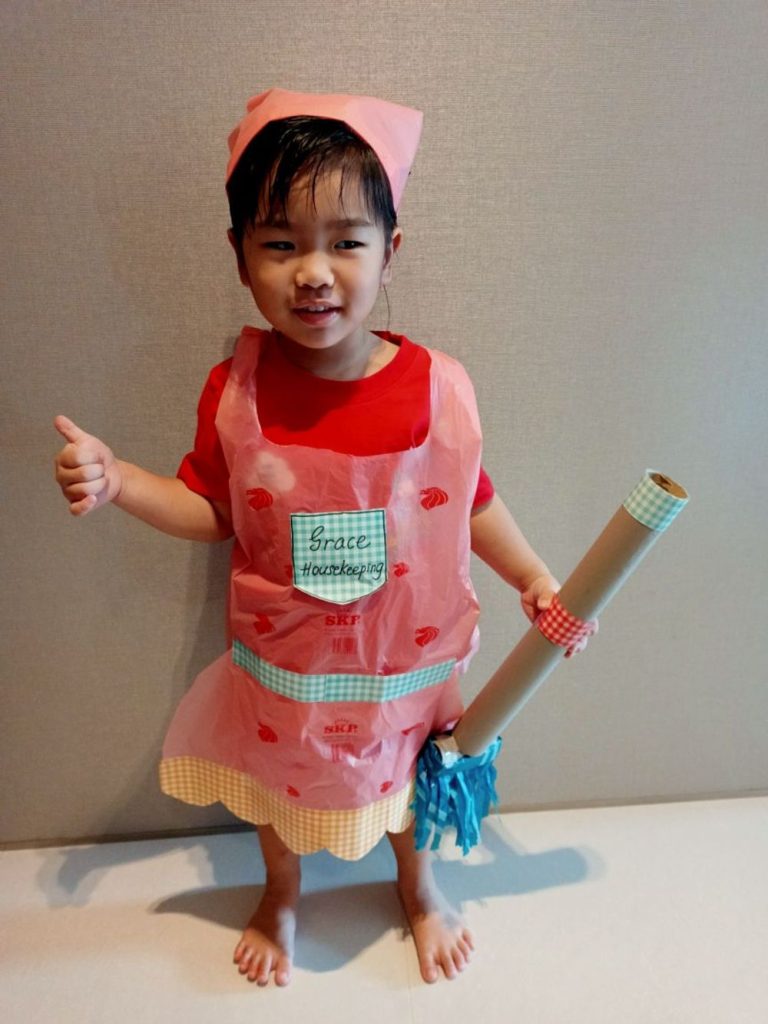
- Organise physical activities
To get children excited and involved in sustainability, teachers can also organise fun activities and games for the whole class to participate in.
In Term 4, the children’s interest in ocean animals continued and they decided to incorporate it into the school’s “Fun and Fit Day” sports event to bring the theme of “Saving the Ocean” to life!

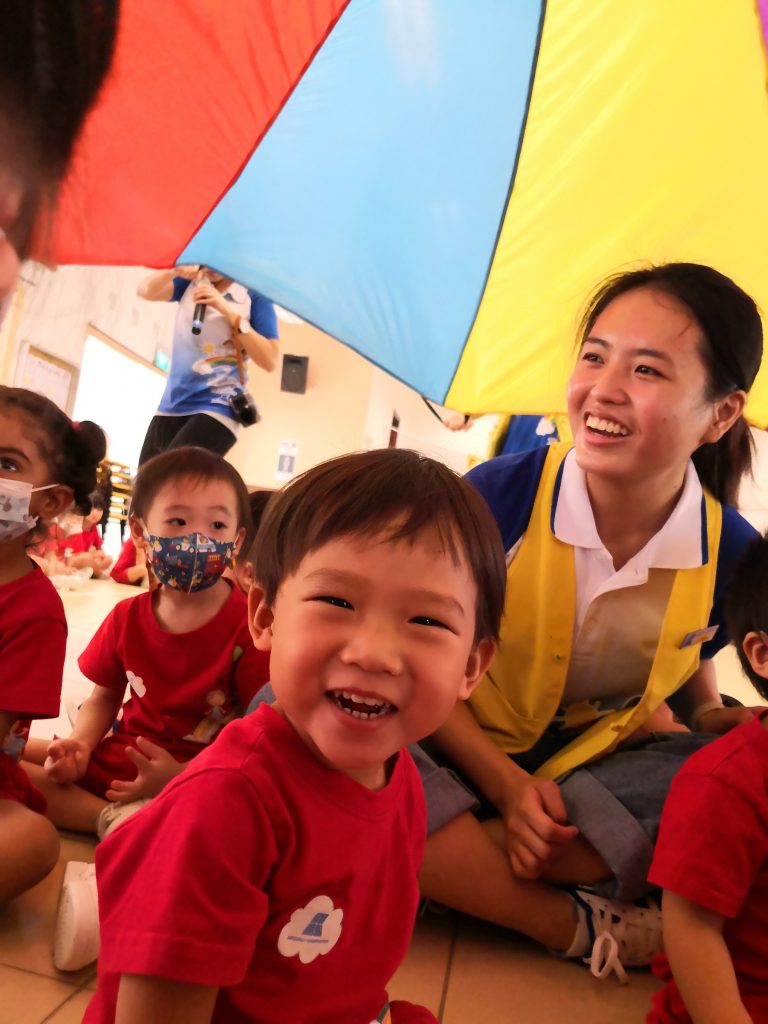

During the event, our younger children took part in relay games where they had to save the “sea creatures” from pollutants such as plastic bags and cups, ghost nets and oil spills.
They also learnt how to move like different animals such as the starfish, octopus, crab and dolphin!
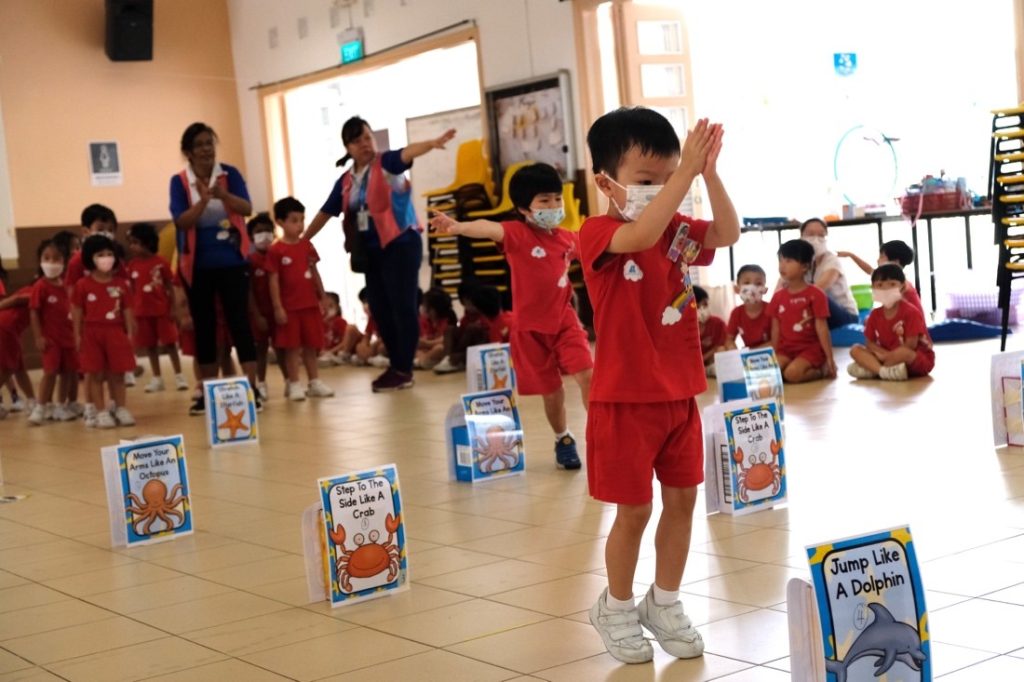
Our older children did their part to save the planet by upcycling recyclable material into props for the obstacle course which they participated in.
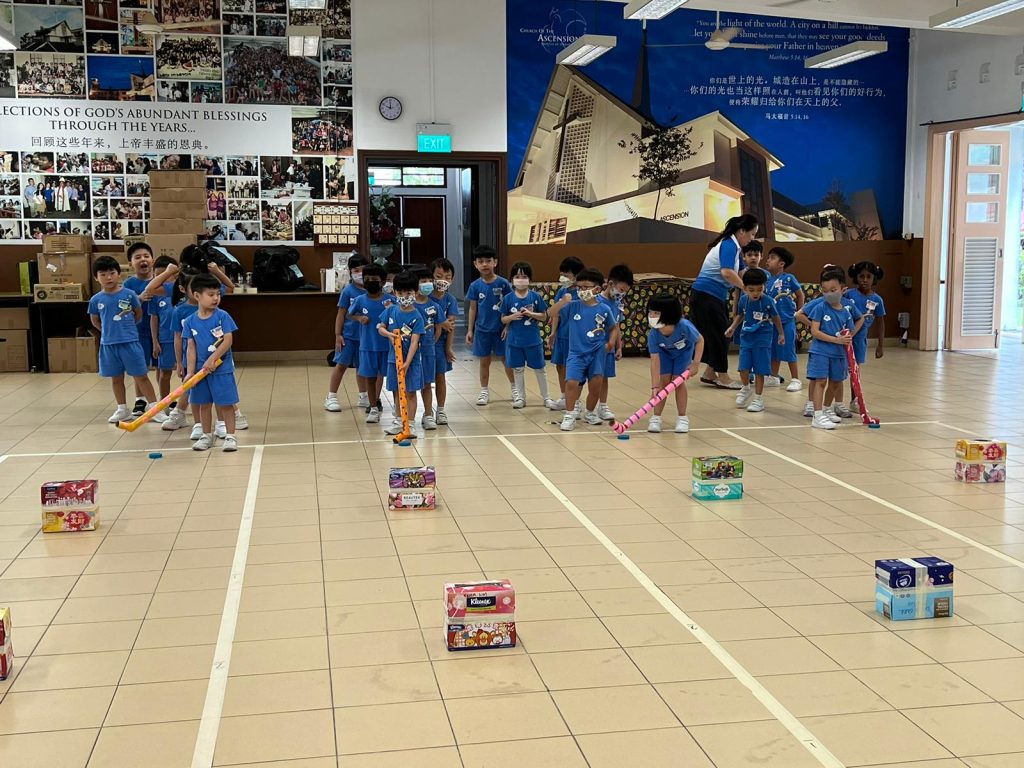
Patricia said: “When they learn about sea animals in the classroom, they learn the facts. But when we played the games, the children got to learn outside the classroom. They were able to do move around physically and socialise with their friends. They learnt how to cheer for each other and work together in a group.”
“There were some children who are very shy but on that day you could see that they enjoyed themselves and they were very fast and took initiative to participate. We did not expect to see this side of them!”
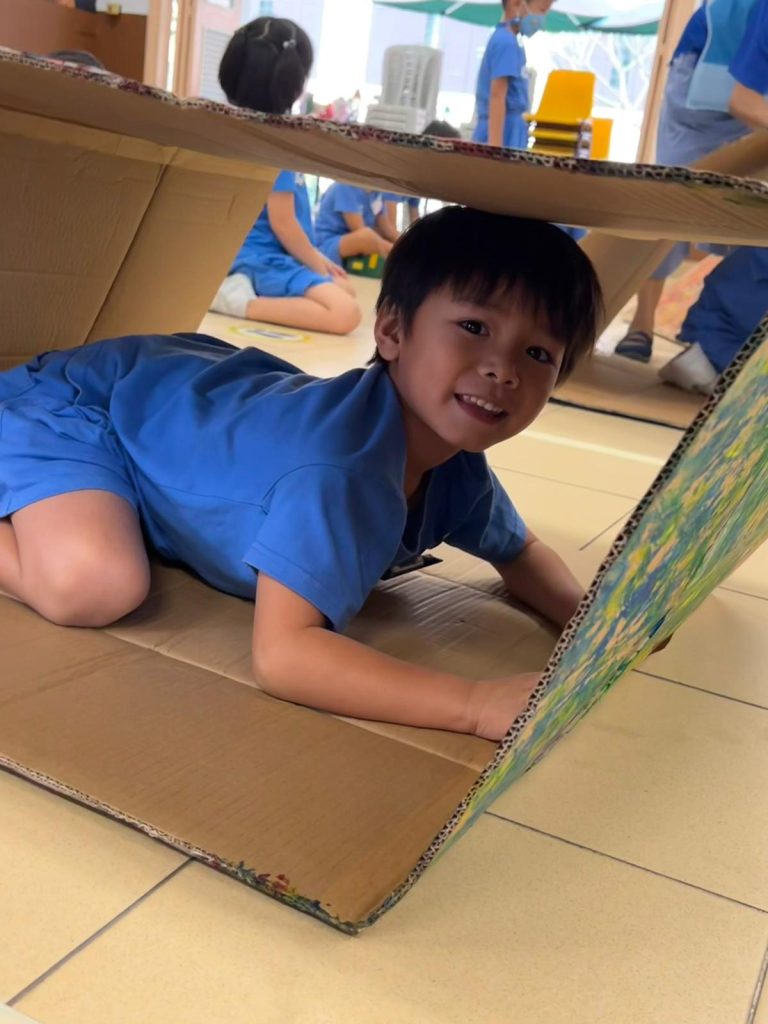

“I can toss and aim. I can do it!” (Right)
Although the “Fun and Fit Day” was held on separate days for each level, the buzz of excitement was in the air throughout the whole month as the children and teachers prepared for the event.
At the end of the day, our children each brought home an apple that served as a reminder to stay healthy.
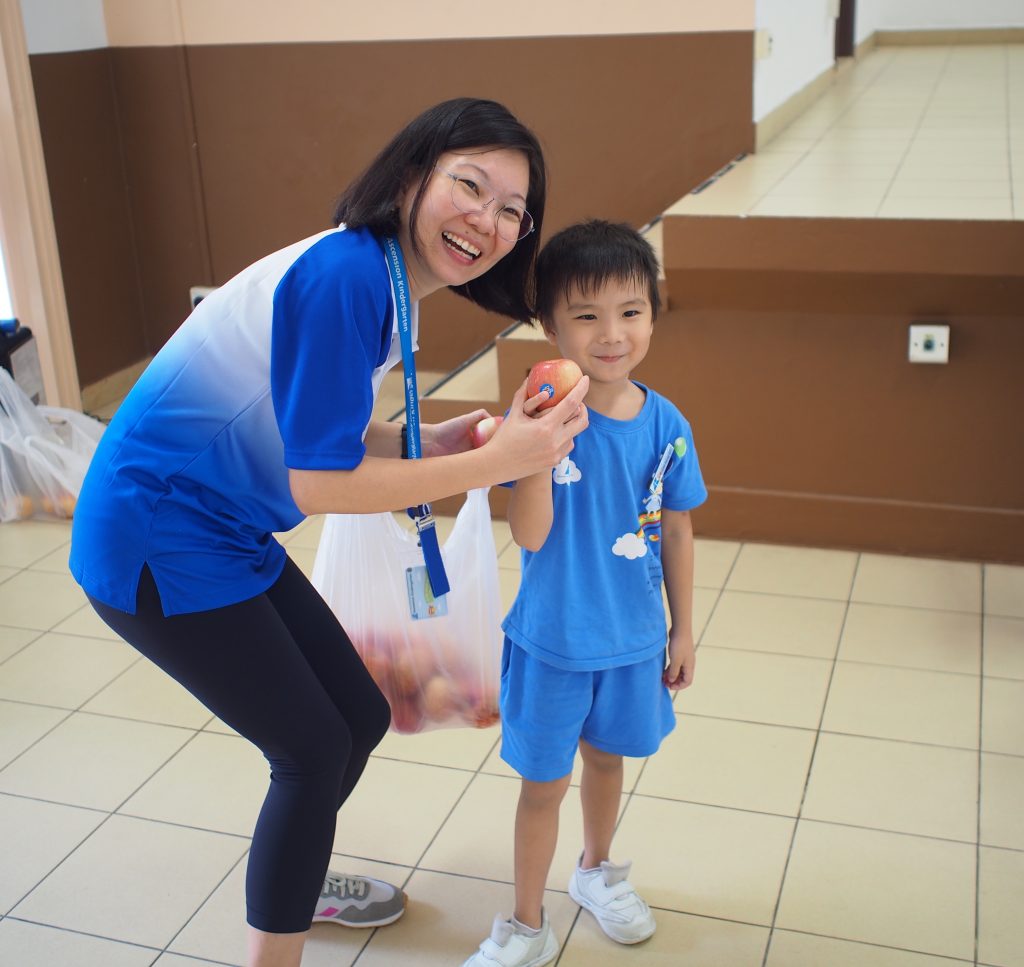
“It was a fun and meaningful event for all our children and teachers. We were proud to see the tenacity and teamwork in the children. We saw how they overcame the challenges in their way and achieved their goals together,” vice principal Ms Janice Bay said.
“Most importantly, we saw how they were grateful and appreciative of the world we live in through their little actions as they learnt to do their part to be good stewards of the world that God has made.”
- Start an edible garden project
Another simple way to encourage care and responsibility to the planet is to start an edible garden project at school or at home.
Visitors and residents in Bukit Batok who walk past Little Seeds Preschool (Sonshine) may have noticed different types of fruits and vegetables such as kang kong, pandan and ginger leaves growing in our lush garden. This is the result of a project that has blossomed in the last 6 months, our Edible Garden.
Several curious uncles and aunties have even stopped to admire the garden as they go about their morning walks, and even gave us a piece of advice or two on how to make the vegetables grow!
So how did the Edible Garden come about?
The idea started when our Playgroup class went on nature walks around the neighbourhood and spotted a garden that was being tended to by a kind Uncle who lived nearby. The garden was very well taken care of and there were some interesting plants that drew the attention of the children and teachers.

Uncle’s open invitations to his mini garden gave the children the opportunity to carry out simple gardening tasks such as weeding, watering the plants and loosening the soil. Seeing that the children were so interested in the plants that they looked forward to visiting his garden, Uncle generously donated seeds and plants for the children to grow themselves at our school.
Around the same time, our K2 children were also doing a project on “Plants”. One of our teachers had read the book “Growing Kitchen Scraps” to the children which sparked their interest in starting their own Edible Garden.
Our teachers worked hard to make the Edible Garden happen by purchasing pots, soil, seeds and gardening tools – the shovels and watering cans were recycled from plastic bottles not just to save the earth, but to ensure that it is safe for our children to use!
After several months of planting, watering the seeds and watching them grow, the Playgroup and K2 teachers and children were ready to harvest some of the vegetables
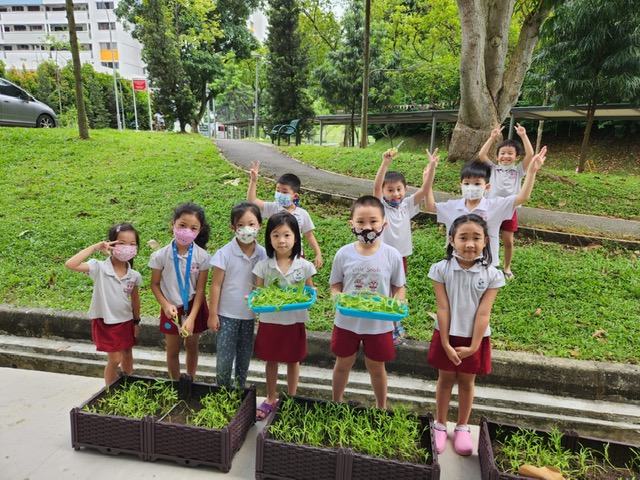
With this first yield, we decided to organise our very first Farmer’s Market where parents were invited to come down to our school and all proceeds from sales of the vegetables were donated to charity.
Even though the teachers and children didn’t know what to expect from the Farmer’s Market and there were many uncertainties – What would the response be like? Will parents support our idea? How much would we be able to make from the sale? – nevertheless, they went ahead with the plan.
On the day of the Farmer’s Market, the Playgroup children drew the crowd in with their loud cheers while the K2 children engaged the “customers”, collected money and manned the cashier. It was a team effort and within 2 hours, all the vegetables were completely sold out!
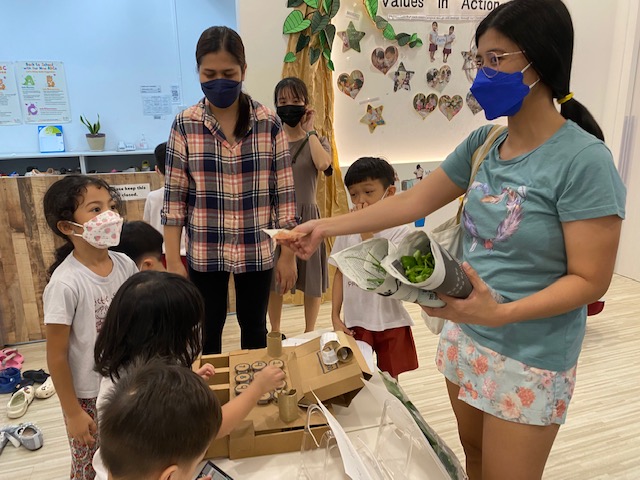
The children cheered with pride and joy to see how successful their first Farmer’s Market turned out. They were glad that the proceeds would benefit children from less fortunate backgrounds.

Through the entire experience, they learnt the value of patience and that good things come to those who wait. They also learnt diligence because gardening requires continued and consistent effort. They are also more grateful to the people who grow our food as they experienced how challenging it was to grow the produce.
They learnt to persevere even when they encounter challenges and to cooperate with each other in order to achieve a common goal.

Most importantly, this project has instilled in them the virtue of hope – Hope in tomorrow. Hope that something fruitful and beautiful will happen if we put our best foot forward, even if there are obstacles in the way.
Centre Leader Mrs Sangeeta Gomez says: “We are grateful to Uncle and all the families who were instrumental in helping this project come to fruition. The donation of plants and seeds for the children to grow and dropping by over the weekend to water our plants were some of the acts of kindness shown. Not forgetting the support by the parents during the Farmer’s Market that was simply amazing!”
“It is heartening to know that the children and teachers felt empowered, they had the opportunity to spend time with nature and discover their own capabilities. This is just the beginning to many more Farmer’s Markets, many opportunities to build and strengthen relationships and establish a sense of community within and outside our school.”
To find out more about our preschools, visit https://littleseeds.edu.sg/ and https://akg.edu.sg/



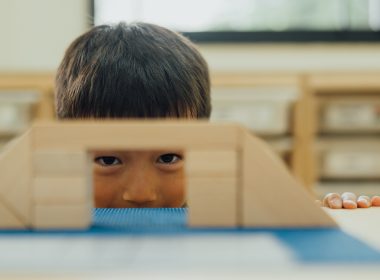
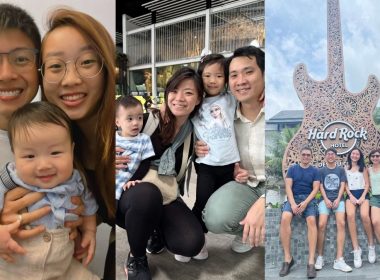







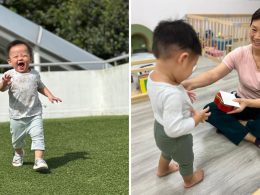
Thanks for inviting me to share about upcycling and saving the environment! Our kids love all the learning and fun activities conducted by the experienced and caring teachers at Ascension.
Hi Sophia, thank you for the engaging and interactive session with our children. They loved learning about upcycling! We look forward to working with parents to create more unique experiences for our children 🙂